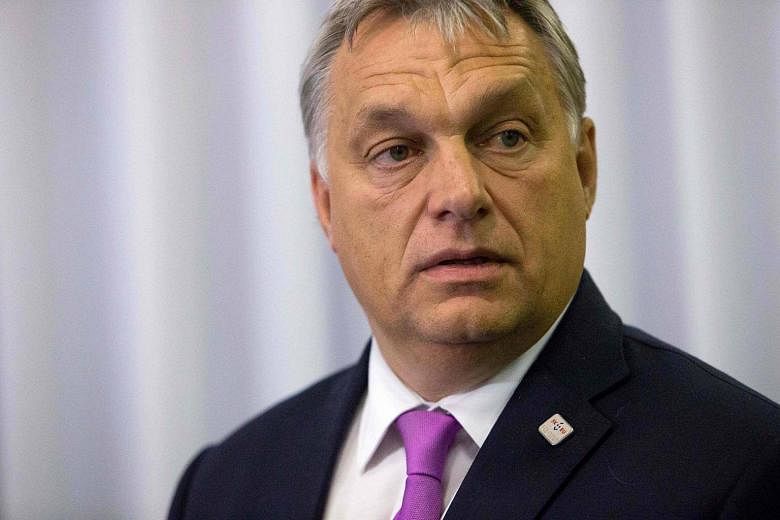BUDAPEST (AFP) - Hungarians looked set to reject the EU's troubled refugee quota plan in a vote Sunday (Oct 2), boosting Prime Minister Viktor Orban's self-styled campaign to defend Europe against the "threat of mass migration".
While there is little doubt that his 'No' camp will comfortably win, the vote could still end in embarrassment for Orban if it fails to reach the required 50-per cent turnout and is deemed invalid.
To avoid this, the right-wing government has led a fierce media offensive urging the eight-million-strong electorate to spurn the EU deal, which seeks to share migrants around the 28-member bloc via mandatory quotas.
Orban warned on Saturday that mass migration was a "threat... to Europe's safe way of life" and that Hungarians had "a duty" to fight the failed "liberal methods" of the "Brussels elite".
"We can send a message to each European... telling them that it depends on us, European citizens, to bring the EU back to reason, with common effort, or let it disintegrate," he wrote in the Magyar Idok newspaper.
The EU proposal - spearheaded by Germany and approved by most EU countries last year - is aimed at easing pressure on Italy and Greece, the bloc's main entry points for hundreds of thousands of people fleeing war in Syria.
But implementation has been slow, as eastern and central European nations remain vehemently opposed to the plan.
Hungary has not accepted a single refugee allocated under the scheme and instead joined Slovakia in filing a legal challenge against it.
The referendum threatens to further split the quarrelling bloc, already weakened by its worst migration crisis since 1945 and Britain's decision in June to leave the union.
"If referendums are going to be organised on every decision of the Council of Ministers and the European Parliament, legal security is in danger," EU President Jean-Claude Juncker warned in late July.
As anti-migrant parties surge in popularity across the continent, Orban has emerged as the populist standard-bearer of those opposed to German Chancellor Angela Merkel's "open-door" policy.
Sunday's poll will ask voters: "Do you want the EU to be able to mandate the obligatory resettlement of non-Hungarian citizens into Hungary even without the approval of the National Assembly?"
Opposition parties and rights groups held protests ahead of the vote, accusing Orban of whipping up xenophobia despite the lack of asylum-seekers in the country.
"This referendum is an effort to mobilise fear and hatred," economist Tamas Bauer told AFP at a rally in Budapest on Friday.
According to a poll published by the Publicus Institute on Saturday, only 46 per cent of 1,000 participants said they would vote, down from 54 per cent last month.
However, the government has already downplayed the consequences of low participation, with Orban insisting the turnout had "no political significance".
"If there are more 'No' than 'Yes' votes, that means that Hungarians do not accept the rule that the EU bureaucrats want to impose on us," he said Friday.
Analysts say the referendum provides a testing ground for the scheduled 2018 general election, in which immigration will be a key issue.
"The referendum is about making sure that 2016 is also about migration in Hungarian politics," expert Andras Biro-Nagy told AFP.
More than 400,000 refugees, mainly fleeing war in Syria, trekked through Hungary toward northern Europe in 2015 before Hungary sealed off the southern borders with razor wire and brought in tough anti-migrant laws, reducing the flow to a trickle.
Other countries on the so-called Balkan migrant trail followed suit, shutting the route and leading to some 60,000 migrants currently stuck in Greece.
The EU said last week it hoped to relocate half of them by the end of next year.
A deal struck in March with Ankara to halt the influx also looks shaky in the wake of a coup attempt in Turkey in July.

